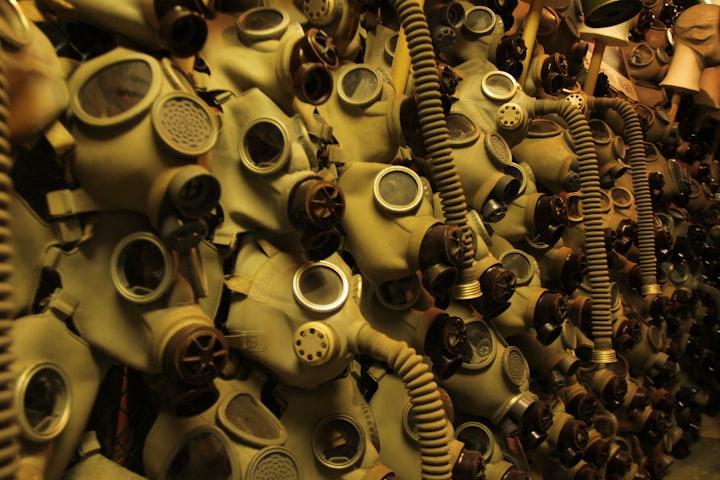
At some point during the unhealthy relationship I found myself tangled up in a few years ago, I did an online search for something along the lines of, “why is my boyfriend so hot and cold?” Which led me to an article that listed 100 signs he might be a covert narcissist.
82 of those signs fit.
However, I was in denial that any of the signs were actual red flags and I immediately explained them away.
At the time, I did not realize how toxic my relationship with him was because I’d (unknowingly) had unhealthy relationships my whole life — starting from childhood. To my dysfunctional understanding of love — his behavior and our relationship seemed pretty normal.
What I didn’t understand then was that I had been raised by a narcissistic mother and I was unconsciously gravitating towards men who treated me the way she did — like an object.
While reflecting on this today, I did an internet search for signs of toxic relationships through the eyes of knowing now what I didn’t know then.
I was disappointed with what I found.
So many of the articles listed signs that can only be recognized from a healthy mindset. But when you’re not yet aware of how your childhood trauma is manifesting in your adult relationships — the signs listed would be almost impossible to see if not presented in the correct context.
So today I am writing the article I wish I would have read when I did that initial search several years ago.
These 5 signs of toxic behavior can pertain to familial, workplace, friend, and romantic relationships.
And if, when you read these, you feel a twinge in your gut — listen to it before your mind tries to explain it away, and consider exploring steps to separate yourself from the person in question.
1. When you first met this person, they seemed extremely familiar and you felt “safe” with them.
I didn’t believe the relationship I was in was toxic because I felt so safe with him. I loved and trusted him immensely and I was convinced he loved me just as much.
However, nothing about the relationship was safe — his behavior just seemed familiar because it’s what I was raised with and our brains naturally associate familiarity with trust.
If you were raised in a toxic environment, your mind has been wired to perceive connection in an unhealthy way.
Do you keep meeting the same kind of toxic people but don't understand why?
It's likely because you're gravitating towards the same unhealthy relationships you experienced as a child.
The truth is, that familiarity you feel as an adult is real — but it’s not for the reasons you think.
Those cold sharp stabs you feel in your gut around the person aren’t butterflies — they are warning signs. Instead of explaining those feelings away — pay attention to what they are trying to tell you.
2. The person’s emotions become unpredictable and you’re constantly doing everything you can to keep them happy.
While at first this person likely seemed perfect — over time you’ve found that their mood is up and down and can change directions on a dime.
Do you feel (or do they tell you that you are) responsible for their mood?
Are you constantly setting aside your own feelings in order to placate theirs?
Do you feel like they have some secret script for how you’re supposed to behave that you don’t have access to but they still expect you to follow? Do they rage when you don't respond in the way they expect you to?
In my relationship, as soon as I started to feel like we’d made it to solid ground, his mood would change and I’d turn myself inside out trying to fix it. But there was no fixing it because as soon as I resolved one issue, he’d come up with another one.
I told myself he was just moody and that I could handle it —however, the constant focus on his feelings meant mine were left on the backburner. I wasn’t allowed to feel anything that took the focus off of him.
These are the same patterns I experienced as a child with my mom and her unpredictable moods. My one focus then was to avoid doing anything that might upset her. So it seemed normal to me that my only purpose was to regulate his moods — this was love, wasn’t it?
If you find yourself constantly trying to keep the peace and unable to safely express any of your own feelings — think back to your childhood. Do you recognize a pattern?
3. The person presents information as truth that you know isn’t true, but you’re expected to agree.
At the beginning of my relationship, I would listen as he retold a story that I had been a part of to someone else — but he’d say things happened that didn’t or he’d rearrange the facts to shine a light on himself or diminish me.
I told myself he just liked to overexaggerate and wouldn’t correct him (because when I’d corrected him early on in the relationship, I’d been punished with anger or the silent treatment.)
To me, this behavior seemed harmless enough. I’d watched my mom and my older sister do this my entire life. Some people just need extra attention, right?
But what I didn’t know is that is a form of gaslighting — and eventually he started using the weapon against me by telling me my perception of reality — my memory — was always wrong.
These little white lies of theirs that you try to convince yourself are harmless are weapons used to gain control. If they are allowed to continue rewriting history right before your eyes, you’ll eventually start to believe you're losing your mind and you’ll become fully reliant on that person to tell you what is right and what is wrong.
This is how they gain ultimate control over you — you eventually depend on them to tell you what is reality, and I promise you that reality will always be crafted to their advantage.
Call them out on their lies. Lies, even if they seem harmless, aren’t normal or excusable and you deserve better.
4. Your arguments are circular and it’s impossible to come to a resolution until you agree to take the blame.
This isn't a term I’ve seen anywhere else, but I call this “argument shifting.” If he was upset about something and I pointed out a perfectly reasonable reason why he shouldn’t be upset, he’d shift the argument. “You don’t understand,” he’d tell me. “I was talking about X, not Y.”
We’d go in circles for hours or days and the only way he’d finally stop is when I’d agree that I was to blame for whatever his imagined slight was — though I was never really quite sure what the issue was because it changed multiple times during the argument.
When you have an argument with the person in question, do you understand what the issue is, or does it constantly move until it lands in your lap and you take the blame?
This is not normal. This is toxic behavior.
Well adjusted people don’t shift the argument — and they certainly don’t put the blame for every time their mood goes haywire on you.
5. Words don’t match actions.
In my relationship, I lived in a world of promises made, promises broken. He’d make big, amazing plans with me (pretend he was taking me on a surprise cruise, talk about going out on his boat for the weekend, say he’d planned a fun weekend getaway) only for things to fall through last minute.
Usually, he’d start a fight and then blame me for the plans falling through. “If you’d just act right….”
I didn’t know it at the time, but he was just a master of “future faking.” This is a common tactic used by toxic people to keep you hooked. They make big promises for the future in order to keep you hanging on through the tears.
If you’re like me, you likely experienced this as a child, too. Big plans and promises were made, but they always fell through — and if you dared ask why or show even the slightest hint of disappointment, you’d be blamed. The truth is, those things were never going to happen in the first place.
In a healthy relationship, we should be able to rely on the other person. Their words should match their actions. If you’re in a constant state of letdown and disappointment, sprinkled with things working out just often enough to keep you hanging on— this is toxic.
Healthy relationships do not feel like emotional rollercoasters.
---
There are toxic people everywhere in this world. Unfortunately, if you were raised by one, this makes sussing them out extremely difficult until you’ve addressed your own childhood trauma. It isn’t an easy process, and there’s not a quick fix — but it is necessary if you want to have healthy relationships in the future.
I am 2.5 years past my last toxic relationship. I’m now not in contact with him, my older sister, my mom, and everyone else I realized displayed toxic behavior patterns.
Life feels a lot less like a rollercoaster these days.
If you’ve seen yourself in any of the situations I presented above, I encourage you to find a solid support system and find a way to work through your past so you can have a much more beautiful future.






Comments
There are no comments for this story
Be the first to respond and start the conversation.